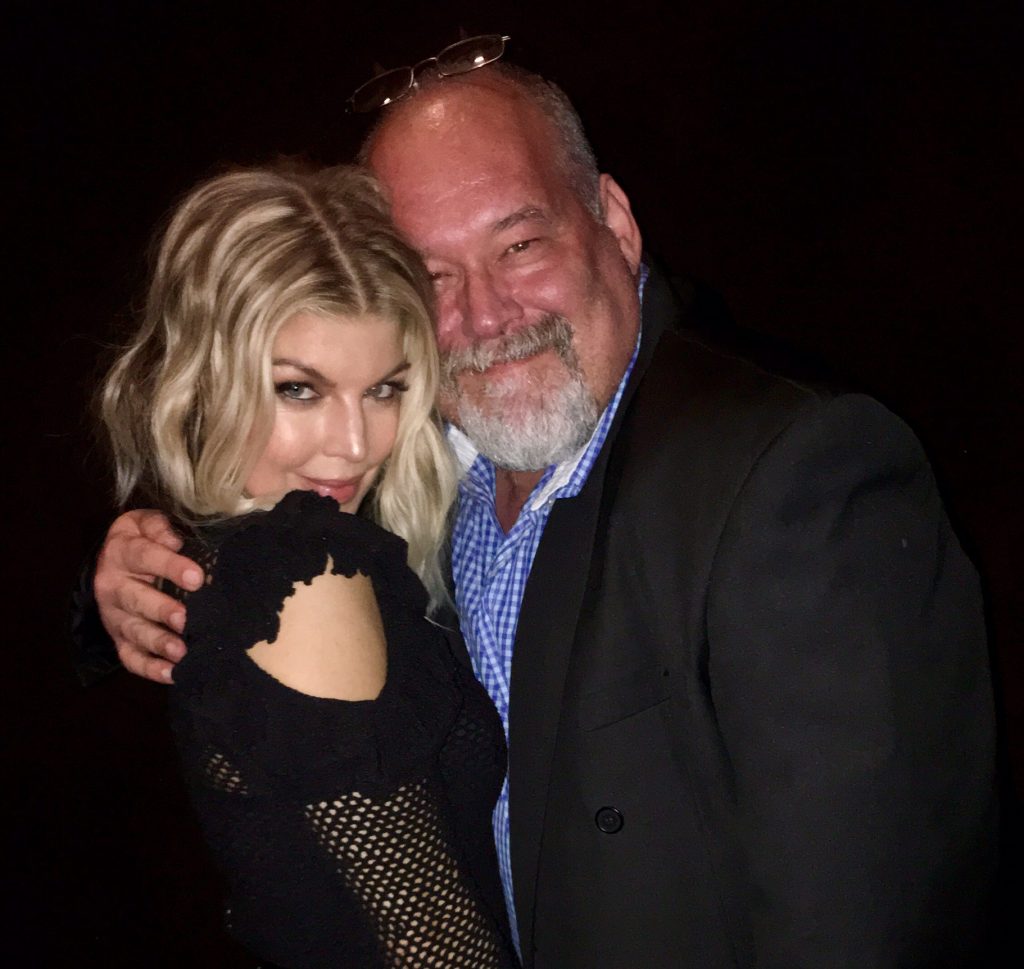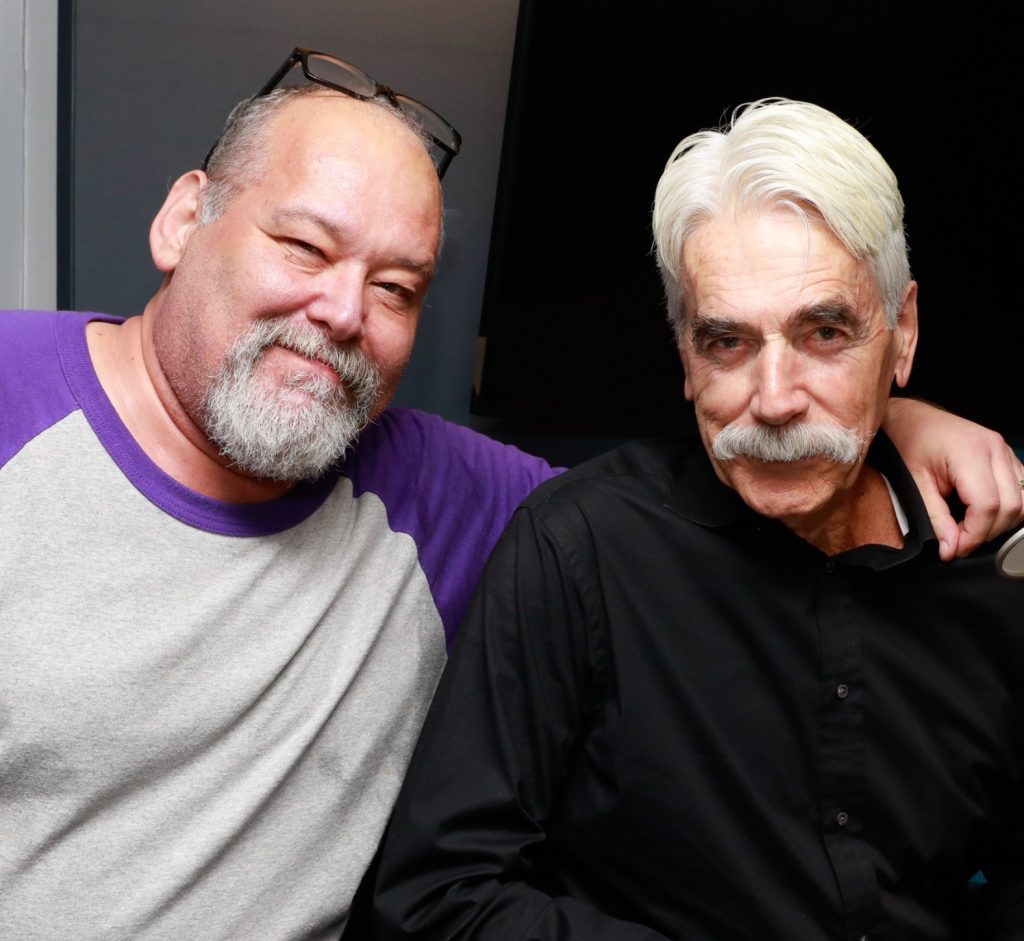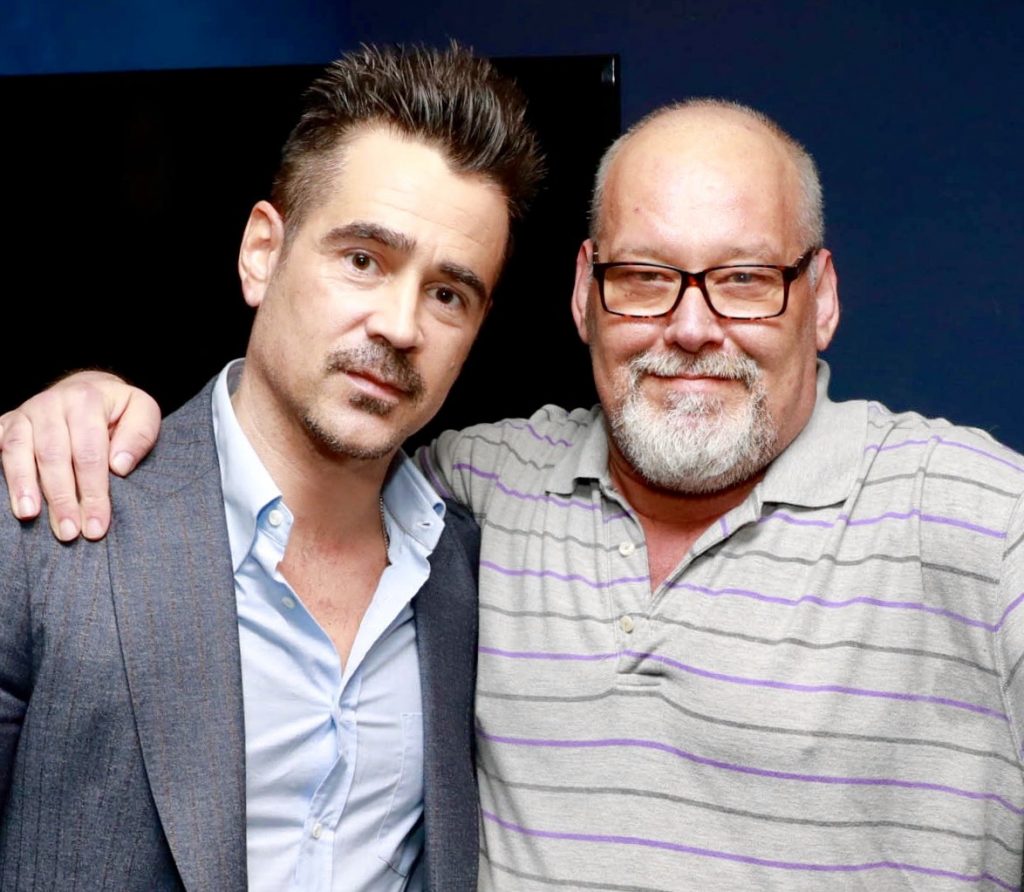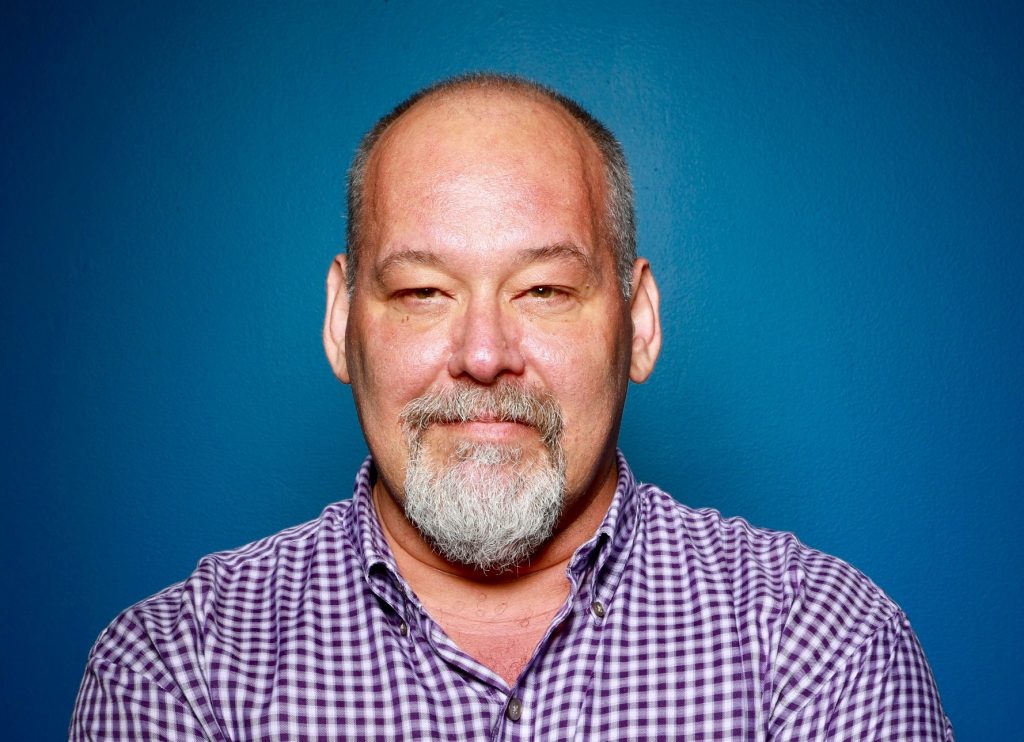Richard meets… Larry Flick
Larry Flick is someone who has been in our ears for many years. Currently, he is the host of his own show on Sirius XM where he gets to interview some of the most amazing performers, singers and actors of all levels.
Larry’s mellow voice and encyclopedic knowledge of music and movies, means he more than holds his own with A-List stars, even Madonna seems to like to come on his show!! So, it’s with a sense of awe that I approach this actually adorable man, and I get to ask him the questions!

Richard Jones: Larry, what a true honor to be the one to turn the table on you and get to ask you a few questions, I want to begin at the beginning, how did you get into the radio game?
Larry Flick: Radio didn’t happen for me until I turned 40. I started in the music business at 21 as a college radio rep at a company called Gold Mountain. It was an indie label distributed by A&M Records. I dropped out of college to do this. I worked mostly with heavy metal and alterna-pop bands. Plus, the dude who ran that label was also an artist manager/music supervisor.
When I wasn’t trying to get college stations to play my records, I was helping out on projects by the rock stars of the day, like KISS, the Power Station, Peter Wolf (of the J. Geils Band) and Dennis DeYoung (of Styx). I got to help out on soundtracks to TV and movie projects like Miami Vice and Bachelor Party. It was like going to grad school. My role was admittedly minimal, but I got to see and learn everything I would need to know about surviving the industry.
From there, I landed at Billboard magazine, my dream destination. I started as a part time assistant/mail sorter, and I eventually became the dance music/single reviews editor. A fantasy come true. I was there for 14 years. When I was let go as part of direction shift for the magazine, I was the senior talent editor, focusing on pop and rock music.
I got my audition for Sirius (before the merger with XM) several weeks after being laid off. And I have been on the air ever since. That was 16 years ago. I was hired to be a sorta gay Howard Stern personality on the LGBT station. From there, it grew into what I’m doing now.
RJ: Do you remember some of your first guests or interviewees?
LF: My very first career interview was with a pre-stardom Lar Ulrich from Metallica for a magazine called Faces Rocks. He was kind and generous with his time. And he has a great memory. He still makes time to talk with me all these years later.
My first big Billboard interview was with the Pet Shop Boys. I got to trail them for a day of promotion for their album of the moment. They were hilarious and charming and wonderfully articulate. We spent nine or so hours together traveling around the New York tri-state area to radio stations. It was another educational moment into the fact that fame and hit records come with a price of hard work and patience.
I actually do not remember my actual first ever Sirius interviews. Among the first was with Emma Bunton of the Spice Girls. She was promoting a solo record, and it was an absolute disaster. My co-host at the time was incredibly awestruck, and a bit creepy as a result. I remember Emma repeatedly shooting me looks, as if to say “help!” Luckily, Emma didn’t hold it against me. We’re very friendly to this day. Those early days were filled with a lot of weird interviews, actually… like then Chastity Bono aggressively challenging me to a wrestling match, and Bam Margera of Jackass asking me to measure his penis length. All of this was live on the air!
RJ: And who has been the most memorable?
LF: Madonna is always memorable. I’ve interviewed her nine times in my career. It’s always intense and terrifying. She is remarkably smart and demanding of the same in everyone in her orbit. That said, she has always been incredibly sweet to me. At her core, she is a music geek. The key to Madonna’s heart is to be curious about her art. Not her money or fashion or fame. She wants to dive deep into poetry and melody and grooves… and she is always asking for the names of new bands to investigate. She is voracious that way.

Adam Lambert also comes to mind. I’ve known Adam since American Idol. He is super sweet and truly hilarious. I landed an interview with him on the day of his first album release. He was all over the news because he kissed his guitarist on stage during the American Music Awards. My bosses at Sirius thought that getting him to talk about that would be the ticket to getting attention. My gut told me “no.” He’d already done a dozen live television interviews that day on the subject. I was getting him at 7pm that night. He was exhausted. I had no less than seven executives pressuring me to ask that question. Instead, midway through our chat, I paused and asked him… “have you ever been fat?” He paused and asked in return, “how did you know?” From there, we talked about body image and self-loathing, and all kinds of things that he’d never spoken of before. THAT is what got us the attention. After that, I was never told what to ask in an interview again. And I learned an important lesson: If you aggressively aim for the “get,” it won’t happen. Truth comes from compassion and empathy.
RJ: I’ve been lucky enough to be in the studio a couple of times when you have been interviewing people, you make it look so effortless, is it?
LF: Absolutely not. There’s a lot of prep. You have to consume what they’re selling… and then you have to find something about them or their project that makes you curious. Sometimes, it just doesn’t happen.
I never go into an interview with notes. I have the necessary plugs in front of me, of course. I try to know what I need to know about why they’re visiting. But I mostly try my best to mentally and physically zero in on the guest. If I have a pile of notes, we’re both distracted by that. You have to read their energy, which is almost always guarded or nervous. I try to let a guest know that they’re safe with me. I give them a chance to tell me if their day has been crummy or overwhelming. And then I will sometimes mirror them by telling them about my day. It pulls some of the focus from them, and it allows them to be in a more natural human exchange. If they’re present, it works. If they’re not, it’s going to be harder work. It’s a crap shoot every single time.

RJ: What’s been the biggest changes in radio/broadcasting during your career?
LF: Like television, it’s all a la carte. Few people make an appointment to listen. They want to know that their favorite show is available when they’re available or in the mood.
RJ: Looking at your Sirius biography, you have worked for KISS and Prince! Wow, tell me more about that!
LF: KISS happened during my first job. As I mentioned earlier, my first boss was one of their managers. This was during the Animalize and Asylum eras. I was mostly a personal assistant to them, meaning I ran errands and generally made sure that they were happy. It was a fun and pretty insane time. I was in the KISS Army as a kid, so it was out-of-body to hang with them the first time I did. After a while, though, I saw that they were actually really cool and sensible guys. I spent most of my time with Eric Carr, the drummer who replaced Peter Criss. He was a sweet, sweet man. We would go to metal clubs together. It was like traveling with a God. People loved him. I was so sad when he died. Such a wonderful man.
I worked for Prince during my Billboard years. I was a consultant for Paisley Park Records in its final years. I would keep Prince up to date on the important records and producers and writers of the time. I sent him a care package of music every week with a detailed report of what was happening. He was a sponge for new music and ideas. He was a lovely guy. Very, very spiritual. He always made me feel like my knowledge was appreciated.
RJ: You mentioned your time at Billboard, what can you tell me about that time? Any fond or crazy memories?
LF: I got to be at Billboard during its finest years, the Tim White era. Tim was the editor-in-chief. What I didn’t learn from my first job at Gold Mountain, I learned from Tim. He ingrained a deep competitive spirit in me. If you’re not first, you’ve lost. That was his motto. Scary. But it also allowed for a lot of experimentation. A creative mistake was always allowed. Careless mistakes or laziness could get you fired. As a result, I took some risks that resulted in participating in the launch of BIG records.
I take immeasurable pride in being the first journalist in the world to write about Mariah Carey and Britney Spears, for example. There were so many records and bands. So many hits and misses. It fueled my addiction to adrenaline. The rush of watching a record you discovered become a hit was indescribable. The pain of watching it stiff was equally intense. And then landing a really tough interview was nuts. I remember convincing Bono to talk to me for the first time. I was akin to a teenage boy scoring a winning touchdown in a football game. I still remember yelling up and down the hall after we talked. My colleagues thought I’d finally lost my mind! I could never get enough of the game.
My years at Billboard were insanely overwhelming. I’m sad to say that I spent so much time in panic mode to stay ahead of the curve that I didn’t always savor the ride as it happened. But I am endlessly proud of what I accomplished. I had a front-row seat to history unfolding.
RJ: As this interview is also going to appear in our sister publication, Bear World Magazine, I have to ask about your time as a bear in NYC back in the day?

LF: Ahh… such a fun era for me. During a tough time in my life, I was nudged into entering the Mr. NYC Bear contest. It was in 2001, just a few months before 9/11. I did it a joke. I got drunk and had a great time strutting across the stage in a jockstrap… and I won!
That lead to an offer to pose for American Grizzly magazine, which was FUN.
That lead to an offer to pose and work for Bearfilms.com, which I did, of course. I did a scene in a movie called Decadent Bears under the name Luke Ryder. It was, by far, the least sexy thing I’ve ever done in my life, but it was oddly fun. And even though I was derided for not being “classic bear” in my appearance – remember, this was also the Jack Radcliffe era – I became pretty popular.
I lived a weird double life as the Billboard guy who did tons of television work, and as Luke the bear model. I remember being in a bear bar one night, right after I’d spent two hours crawling around doing a Boots 2 Balls inseam raffle in my underwear, and there I was on the TV monitor on Access Hollywood wearing a suit and tie. The guy I’d just measured asked, “is that YOU?” as he pointed at the screen. It was hilarious… and WEIRD!
I’d found a home and acceptance in the bear world. I competed in the Mr. IBR contest twice. I placed top 10 both times. I entered and won the Mr. DC Bear Invasion in 2002. Before all was said and done, I posed in three magazines, two calendars, and a few web spreads.
It was a fun time… until it wasn’t. After a while, it all became snarky and toxic and cruel. Who was and who was not a bear became a mean spirited question that I kept hearing. It was often used as a weapon against really big sized guys or thin admirers. Then there was the whole A-Bears elitist thing. And then the backlash against “sash bears.” And then the stigma of doing porn. It all got really stupid, quite frankly.
For me, the bear world had started to mirror the most toxic parts of the mainstream gay world that it claimed to reject. After a while, I checked out. I still identify as a bear, and I miss that world a lot. I often wonder what it’s like now.
RJ: As a slightly older member of the LGBT community, what is life like after 40?
LF: Being a “dad” is an interesting ride. I like it. My views don’t always jibe with the new generation, and that’s fine. These are different times. My neck only gets stiff when I feel like kids don’t recognize that blood on the pavement that they walk upon. Many of my dead friends would have given anything to see and appreciate the privileges and rights that young people often take for granted.
I also struggle with getting older as a gay man because I don’t have elders to look to for guidance. They’re gone. AIDS has taken away a generation of men with lessons that I never got to learn. I often find myself flailing in my effort to be a dignified older gay man as a result. I grieve the loss of role models on a daily basis.
RJ: What does the future hold for you?
LF: I have no clear idea. I love my work, and I hope to do it for a long time to come. But I’m also craving new adventures… new projects… and more time to just hang out with my husband. I have been on the hustle for 35 years. I’m still ambitious, but part of the ambition is to savor life more. I want to be a grand ol’ man.
Listen to Larry on SiriusXM
In Depth with Larry Flick, SiriusXM’s first app-exclusive program. New interviews with celebrities and newsmakers are available weekdays. Flick is also the morning host of Studio 54 radio on SXM, weekdays, 7am – 12noon.






